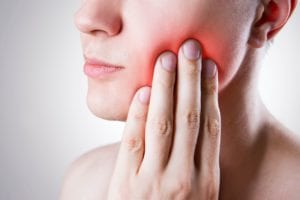It can be difficult to fully tell if you’re grinding your teeth. Many times it happens when you’re sleeping or subconsciously throughout the day due to stress. Do you have a teeth-grinding problem? Dr. William Huckin, a dentist in Dallas, TX explains the warning signs and how to help stop the habit.
What is Bruxism?
Teeth grinding is usually called bruxism in a clinical setting. It can be caused by a variety of things. If you’re stressed out, you tend to grind your teeth more. When this happens regularly it can cause pain and damage to your teeth. Bruxism can also be caused by an imbalance in the bite or due to a TMJ disorder. A combination of any of these causes may also be correct.
How Do I Know if I’m Grinding My Teeth?
If you’re making sure you see your dentist regularly, he can determine by the state of your teeth if you’ve been grinding your teeth. Without a dentist’s look, you usually can only tell that you’ve been grinding your teeth after some damage has already happened. One of the most prominent symptoms is a pain in your face and jaw, along with headaches and earaches. The tension can radiate down through your neck and shoulders as well.
Grinding also causes your teeth to get worn down and flattened. They may also show chips and cracks due to the pressure clenching and grinding can cause. You’re also causing more pressure on the muscles of your jaw. When you open and close it, you may notice clicking and popping that you didn’t have before.
Taking Care of Teeth Grinding
Dr. Huckin will do a thorough evaluation of your mouth to determine the cause of your teeth grinding. He’ll also talk to you about any symptoms you’ve been having that he won’t be able to directly see, like headaches and tension. A common treatment plan is a special nightguard. It repositions your jaw and prevents you from grinding your teeth as you sleep.
Other forms of treatment may be used separately or along with the nightguard. If you’re suffering from a lot of stress and anxiety, we may suggest counseling to try and reduce that worry. There are various physical exercises you can do that’ll help to relax your jaw muscles. Lastly, we may look into a prescription for muscle relaxers to make sure that your jaw muscles stay relaxed.
Do I Have a TMJ Disorder?
Teeth grinding is a common symptom of a TMJ disorder. TMJ disorders are caused by a damaged jaw joint, tension in the muscles around it, or both. This can cause a lot of pain and impact how you function in your day to day life. Dr. Huckin will determine if your teeth grinding has lead to a TMJ disorder. We’ll want to make sure treatment will reduce the stress on this joint.
Treating Teeth Grinding at Your Dallas, Texas Dentist
Are you experiencing one or multiple of the symptoms listed? It’s time for a checkup. Call us or schedule an appointment online.
